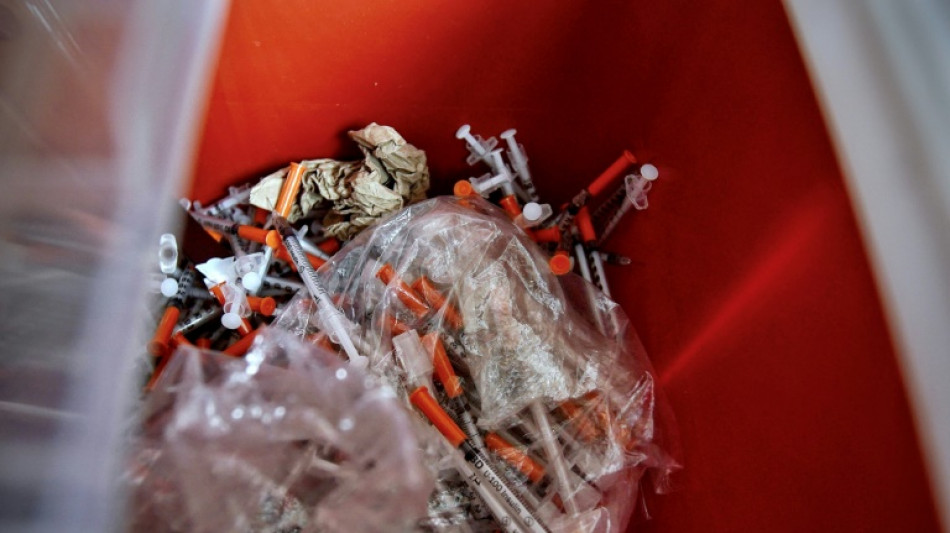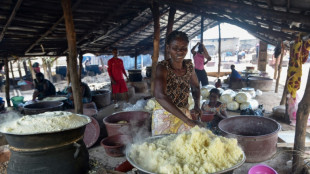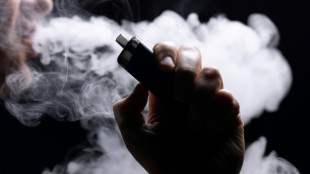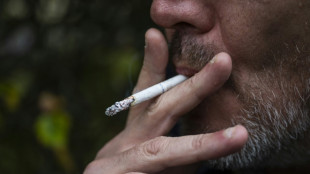
-
 UK's Starmer offers 'plan for change' in reset bid after 150 days
UK's Starmer offers 'plan for change' in reset bid after 150 days
-
South Korea president clings to power after martial law U-turn

-
 Presidential vote seen as referendum on Romania's European future
Presidential vote seen as referendum on Romania's European future
-
Hamilton bids farewell to Mercedes as Ferrari vie for title

-
 New Zealand unchanged in bid to hit back against England
New Zealand unchanged in bid to hit back against England
-
Macron seeks remedy to France's political crisis

-
 New Natalia Lafourcade album celebrates music's onstage evolutions
New Natalia Lafourcade album celebrates music's onstage evolutions
-
Taiwan's Lai kicks off visit to US territory Guam

-
 Ivory Coast staple cassava meal gains UNESCO heritage status
Ivory Coast staple cassava meal gains UNESCO heritage status
-
OpenAI to partner with military defense tech company

-
 Liverpool held but Slot salutes 'special' Salah
Liverpool held but Slot salutes 'special' Salah
-
Man City needed to break losing 'routine', says Guardiola

-
 Leipzig down Frankfurt to reach German Cup quarters, Cologne strike late
Leipzig down Frankfurt to reach German Cup quarters, Cologne strike late
-
Mbappe admits penalty miss 'big mistake' as Bilbao beat Real Madrid

-
 'Sad, disappointed' Mbappe pays penalty as Bilbao beat Real Madrid
'Sad, disappointed' Mbappe pays penalty as Bilbao beat Real Madrid
-
US stocks surge to records, shrugging off upheaval in South Korea, France

-
 Liverpool held in Newcastle thriller, Arsenal inflict Amorim's first defeat
Liverpool held in Newcastle thriller, Arsenal inflict Amorim's first defeat
-
Shiffrin confirms she'll miss Beaver Creek World Cup races

-
 Corner kings Arsenal beat Man Utd to close gap on Liverpool
Corner kings Arsenal beat Man Utd to close gap on Liverpool
-
Mbappe pays penalty as Bilbao beat Real Madrid

-
 NFL Jaguars place Lawrence on injured reserve with concussion
NFL Jaguars place Lawrence on injured reserve with concussion
-
North Korea, Russia defence treaty comes into force

-
 Openda hits brace as Leipzig beat Frankfurt in German Cup last 16
Openda hits brace as Leipzig beat Frankfurt in German Cup last 16
-
Schar punishes Kelleher blunder as Newcastle hold Liverpool in thriller

-
 De Bruyne masterclass helps Man City end seven-game winless streak
De Bruyne masterclass helps Man City end seven-game winless streak
-
Syrian rebels surround Hama 'from three sides', monitor says

-
 Lawyers seek leniency for France rape trial defendants, blaming 'wolf' husband
Lawyers seek leniency for France rape trial defendants, blaming 'wolf' husband
-
OpenAI chief 'believes' Musk will not abuse government power

-
 Thousands rally in Georgia after police raid opposition offices
Thousands rally in Georgia after police raid opposition offices
-
S. Korea opposition push to impeach president

-
 Powell 'not concerned' US Fed would lose independence under Trump
Powell 'not concerned' US Fed would lose independence under Trump
-
French government falls in historic no-confidence vote

-
 Syrian White Helmets chief 'dreams' of never pulling a body out of rubble again
Syrian White Helmets chief 'dreams' of never pulling a body out of rubble again
-
NBA Suns lose Durant for at least a week with ankle injury

-
 Warhammer maker Games Workshop enters London's top stocks index
Warhammer maker Games Workshop enters London's top stocks index
-
Iran Nobel winner released for three weeks, 'unconditional' freedom urged

-
 Red Cross marks record numbers of humanitarians killed in 2024
Red Cross marks record numbers of humanitarians killed in 2024
-
Johnson's Grand Slam 'no threat', says World Athletics boss Coe

-
 Qatar's emir and UK's Starmer talk trade as state visit ends
Qatar's emir and UK's Starmer talk trade as state visit ends
-
Cuba suffers third nationwide blackout in two months

-
 Russia, Ukraine to send top diplomats to OSCE summit in Malta
Russia, Ukraine to send top diplomats to OSCE summit in Malta
-
Spanish royals to attend memorial service for flood victims

-
 LPGA, USGA new policy requires female at birth or pre-puberty change
LPGA, USGA new policy requires female at birth or pre-puberty change
-
Stick to current climate change laws, US tells top UN court

-
 British Museum chief says Marbles deal with Greece 'some distance' away
British Museum chief says Marbles deal with Greece 'some distance' away
-
Pope Francis receives electric popemobile from Mercedes

-
 Gaza civil defence: thousands flee Israeli strikes, evacuation calls
Gaza civil defence: thousands flee Israeli strikes, evacuation calls
-
Trump names billionaire private astronaut as next NASA chief

-
 Pidcock to leave INEOS Grenadiers at end of season
Pidcock to leave INEOS Grenadiers at end of season
-
Seoul stocks weaken, Paris advances despite political turmoil


US fight against opioid overdoses becomes one of racial justice: researcher
In 2020, the death rate from drug overdose among Black people surpassed that of white people in the United States for the first time since 1999, according to a study published this year.
Its author, Joseph Friedman, a researcher at UCLA University in California, details for AFP the reasons for this recent shift.
- What were the different waves of opioid overdoses in the United States? -
The first wave was overdoses coming from prescription opioids that were essentially provided to the population through the healthcare system ... And then, as the US started to cut back heavily on prescription opioid access, a lot of people started using heroin.
That was associated with a large increase in overdose deaths because people are moving from a less dangerous to a more dangerous form of opioids ... And then the third wave is the shift to illicit fentanyl.
And here is where the US really kind of became an extreme global outlier in terms of overdose. Because illicit fentanyls are potentially several hundred times more potent than heroin by weight.
And the fourth wave is what we're seeing very recently, which is a huge increase in polysubstances, which means: basically people are using fentanyls but they're also mixing them with many different kinds of other substances. Some of this is intentional and much of this is unintentional.
- Why did you start studying racial inequalities in drug overdoses? -
There's been this narrative, a very powerful kind of cultural narrative in the US, historically, over the past like 10 or 15 years, that addiction and overdose was a quote unquote, white problem.
And this is something that I have written about critiquing.
It's true that during the first wave of the overdose crisis, white overdose death rates were higher than Black overdose deaths rates. In 2010, they were actually double, so approximately twice as high.
But that has really shifted. Basically after the first wave, we've seen overdose deaths rise faster among Black individuals than white individuals.
So basically, the only time where it was true that white communities were disproportionately affected was because of prescription opioids.
The roots of that are complex, but it's pretty clear that that relates to the deep-seated structural racism in the healthcare system, that actually really denies access to controlled substances to people of color.
- What is the situation today? -
Black communities are disproportionately affected by the shift of fentanyls. For the first time since the 1990s, the Black overdose death rate overtook the white overdose death rate in 2020.
The goals of overdose prevention now really align with the goals of racial justice movements.
There's really good evidence that fentanyl has made incarceration a very potent risk factor for overdose death. Immediately after people are released from prison, there's a huge spike in the risk of overdose death.
Combined with mass incarceration of Black communities, which we know is a big problem in the US, this is one of the key driving factors.
With the drug supply becoming so dangerous, it requires a lot of resources to stay safe. Access to health care, access to substance use treatments, access to harm reduction, housing, employment... all of these things give stability.
And so inequalities in these root conditions are, I think driving inequalities in overdose now.
People of every racial group use drugs. That's just a fact of life. Who dies from them is dictated by access to resources and cultural patterns, and there are deep-seated inequalities in terms of the resources that people need to stay safe.
- What do you think the answer should be? -
Basically the war on drugs, this police centric approach, has been an utter failure.
Our overdose death rates are something like three times higher than the second worst country, and they're over 20 times the average.
We have the worst drug overdose death rate in recorded history. There's never been anything even close to what we're experiencing right now.
We would need really, really profound restructuring of the way society spends money on drugs to actually make a difference here.
Harm reduction is an important solution, but it is not getting at the root issues here.
Which is access to treatments, and making the drug supply safer.
In Europe, in many places there's just heroin prescription programs. That's the kind of stability that helps people overcome substance use disorder.
J.Horn--BTB




